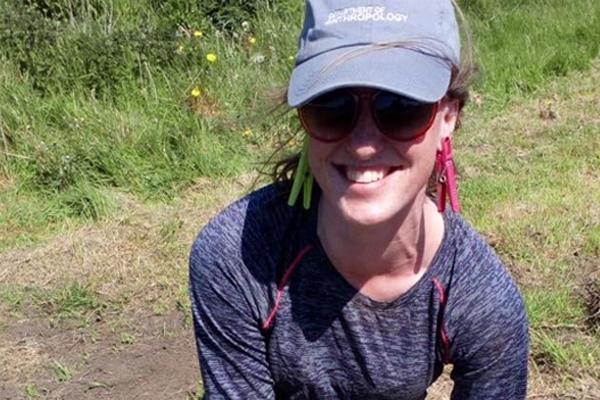Melissa Clark awarded Graduate Associate Teaching Award

Every year, The Ohio State University selects ten graduate students to bestow the Graduate Associate Teaching Award (GATA) upon. This award is renowned as, “Ohio State’s highest recognition of the exceptional teaching provided by graduate students serving as Graduate Teaching Students.” This year, PhD Candidate Melissa Clark was one of those ten recipients. She is the first student in our department to receive the award.
Clark—who will be defending her dissertation this year—has been with OSU as a PhD student since 2015, returning to her alma matter (’13) after completing a Masters at Bradford University (UK). During that time, she has taught nearly all of the intro courses that a graduate student can teach: Introduction to Physical Anthropology (ANTHROP 2200-- AU17, SP18, SP20), Introduction to Archaeology (ANTHROP 2201—SP16, AU16), Introduction to Cultural Anthropology (ANTHROP 2202—SP17), and Crisis! An Anthropological Perspective of Global Issues (ANTHROP 3597.01—SP19, AU19). Clark has also served as the co-resident director for the history course The History and Archaeology of Medieval Ireland: Trim and the Blackfriary (HIST 3798.01, SU 16–19), a hands-on study-abroad archaeology session (her photo is from this course). For many of these, Clark authored or co-authored the syllabus, modifying the original design to fit her teaching style.
As a teacher in a world of “uncertain job security, automatization, and increasingly rapid forms of communication,” Clark believes her role as a teacher as one that provides students with “transferable professional, cognitive, and emotional skills that foster independence, flexibility, and resilience.” To provide these, she champions a modified problem-based learning (PBL) format. Clark uses this format to, “facilitate student-led learning, independent research skills, and critical thinking, and to foster effective interpersonal skills and teamwork. Within a PBL structure, students are active producers of knowledge rather than passive recipients.” While this approach is useful for all student—fostering both flexibility and creativity—it particularly aids underrepresented students who may be impacted by structural inequalities in education. By giving a students a safe space to fail, Clark’s classroom allows students to try new directions or solutions that may have otherwise been left unexplored. Clark promotes this level of trial-and-error—a growth mindset—by scaffolding her assignments and allowing students to resubmit until they achieve mastery.
This approach has proven useful to her students. One writes, “[Melissa] cares more about the success and learning of her students more than any other professor I have ever had, and outside of just anthropology.” Another says, “I gained valuable life skills from this class, far beyond the education of anthropology.”
Outside of the classroom, Clark mentors students in the bioarchaeology laboratory. Here, she trains students in the identification and analysis of skeletal remains. Clark notes that, “this is particularly important for women, who are underrepresented in science across almost all fields,” and argues that “by being exposed to women in science, young women are more easily able to imagine themselves in that position in the future.” To date, her mentorship has resulted in two student papers presented at the annual American Association of Physical Anthropology (AAPA) meetings, as well as successful placement of students into internships and field schools.
Her mentorship is not limited to undergraduates. During the 2019–2020 academic year, Clark has served as the Graduate Teaching Fellow (GTF). In this position, Clark has been the first point of contact for 24 other Graduate Teaching Associates teaching four different courses, assisting them with any questions about their class or students. While in this position, she has been involved with the redesign of ANTHROP 2202, our flagship course, and the update of ANTHROP 2201. Prior to this, Clark served as the President of the Graduate Students in Anthropology Association (2017–2018).
After graduation, Clark seeks to continue teaching and mentoring anthropology students at a new homes university. We wish her success with her endeavors, and know that she will bring students joy wherever she goes.
